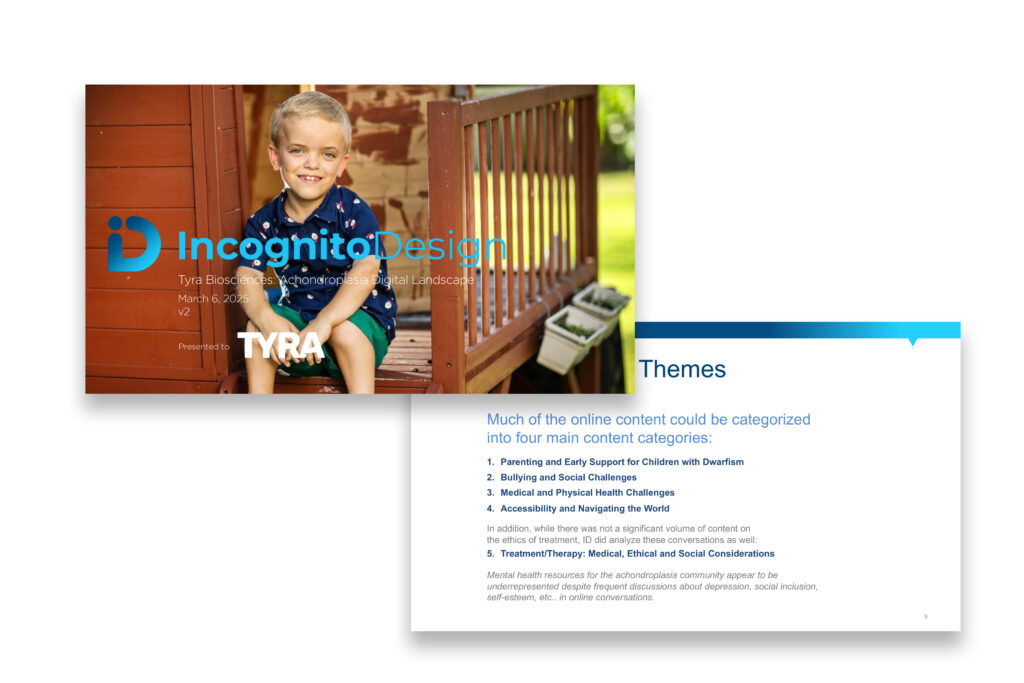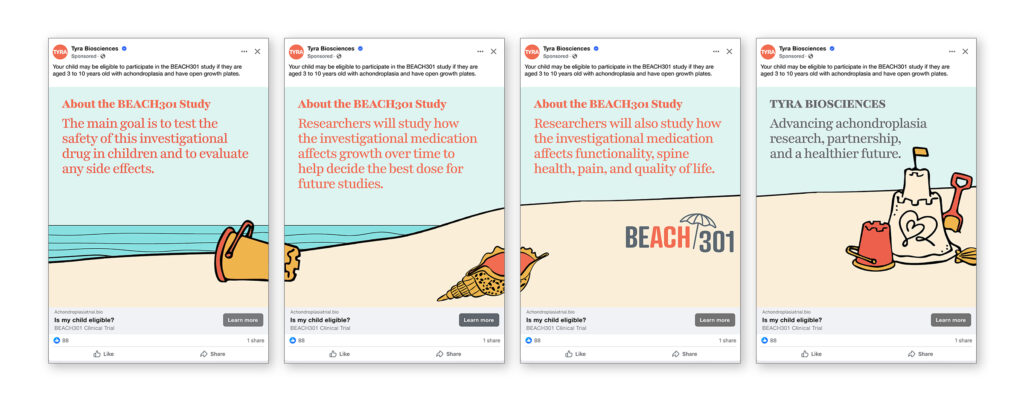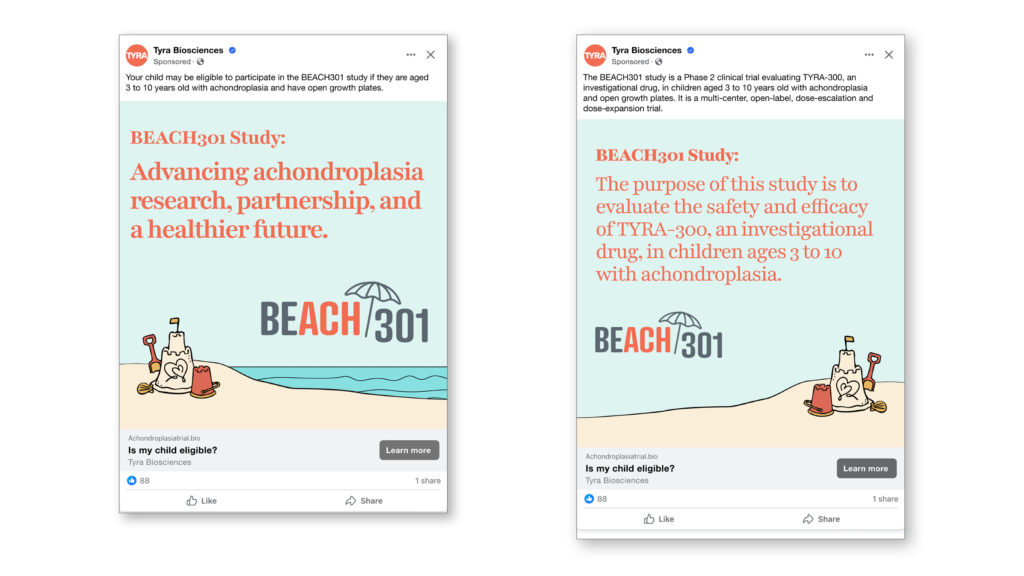TYRA Biosciences
Clinical Trial Marketing & Recruitment Social Media Campaign
Tyra Biosciences is a clinical-stage biotechnology company developing next-generation precision medicines targeting Fibroblast Growth Factor Receptor (FGFR) biology. In October 2024, Tyra received FDA clearance to begin a Phase 2 trial of TYRA-300 for children with achondroplasia, a genetic condition caused by variants in the FGFR3 gene. Unlike the current standard therapy—delivered by daily injections—TYRA-300 has the potential to be taken orally, offering children and families a more accessible treatment option.
To support patient and caregiver recruitment for the trial, BEACH301, Tyra partnered with Incognito Design to create a comprehensive caregiver-focused communications strategy, combining social media and search marketing outreach with in-depth community research.

Understanding the Landscape
We began by mapping the online world where achondroplasia caregivers connect, share experiences, and seek guidance. This digital landscape review was designed to answer critical questions:
- Where and how do caregivers engage online?
- What search terms, tone, and content define their conversations?
- Who are the trusted influencers shaping these communities?
Our analysis revealed a highly engaged, yet nuanced digital ecosystem, where discussions often span both day-to-day parenting challenges and deeper medical, ethical, and social questions.
Epidemiology & Context
- Achondroplasia occurs in approximately 1:15,000 to 1:40,000 live births annually in the U.S., with a global prevalence of 1–9 individuals per 100,000.
- More than 80% of cases are sporadic (de novo), meaning most children with achondroplasia are born to average-height parents who may have little prior exposure to the condition.
- Fathers over age 35—and especially over 50—have significantly increased rates of fathering children with achondroplasia.
This context underscored the importance of meeting families where they are—often navigating a brand-new diagnosis and seeking trustworthy, accessible information.
Key Themes in Online Conversation
Our review found that most online discussions within achondroplasia communities could be grouped into four core themes, each shaping how caregivers approach decisions about treatment and clinical trial participation:
- Parenting & Early Support
Parents frequently seek guidance on growth milestones, school accommodations, medical treatments, and accessibility solutions. Common conversations included adaptive toys and bikes, leg-straightening procedures, building confidence, and connecting with support networks. - Bullying & Social Challenges
Caregivers and individuals alike discuss strategies for navigating stares, jokes, unwanted attention, and discrimination. There is a strong emphasis on teaching self-advocacy, building resilience, and using respectful language such as “person with dwarfism” or “little person.” - Medical & Physical Health Challenges
Parents exchange experiences around common health concerns like spinal stenosis, joint pain, and sleep apnea, as well as major surgical interventions. Many discussions focus on finding knowledgeable healthcare professionals and understanding available clinical trials. - Accessibility & Navigating the World
From everyday household modifications to public-space advocacy, families share solutions for increasing independence and call for more inclusive design. Clothing, adaptive cars, and travel challenges are frequent points of discussion.
Ethical & Social Considerations
While not the dominant theme, conversations around the ethics of treatment do arise. Some voices—particularly from advocacy groups such as Little People of America (LPA)—stress the importance of “Dwarf Pride” and celebrate difference rather than framing dwarfism as a disability in need of a cure. Importantly, even LPA acknowledges the value of treatments that improve quality-of-life outcomes, such as reducing spinal stenosis, sleep apnea, or corrective surgeries.
This nuance highlighted the need for campaign messaging that is both empathetic and respectful—acknowledging the diversity of perspectives within the community.


Strategy & Execution
With these insights in hand, we collaborated with Tyra to shape a campaign that would:
- Build awareness of the BEACH301 trial in a trustworthy and compassionate voice.
- Target caregivers where they are most active online, using the language, tone, and content most likely to resonate.
- Complement and drive traffic to the existing BEACH301 trial website, with a focus on tracking conversions and optimizing engagement over time.
Our process included:
- Stakeholder Interviews – clarifying Tyra’s recruitment goals and ensuring alignment with the BEACH301 brand.
- Prototyping – developing ad concepts across formats (static graphics, carousel posts, video snippets) and building a framework for search marketing with targeted ad copy, keywords, and segmentation.
- Execution – producing eight final social media ads for Facebook and Instagram, alongside a text-based search campaign, all optimized for regulatory review.
- Ongoing Optimization – launching a 12-month cycle of monitoring, bid management, keyword refinement, and monthly performance reporting to continuously improve campaign effectiveness.
The Outcome
The BEACH301 recruitment campaign established Tyra as a clear, consistent, and supportive presence in the achondroplasia caregiver community. By grounding outreach in research-driven insights and listening closely to the needs of parents and advocates, the campaign built trust while helping families access information about a new potential treatment option.
For Tyra, the work went beyond digital advertising—it became a way to honor the voices of the community while advancing clinical research with empathy, clarity, and respect.